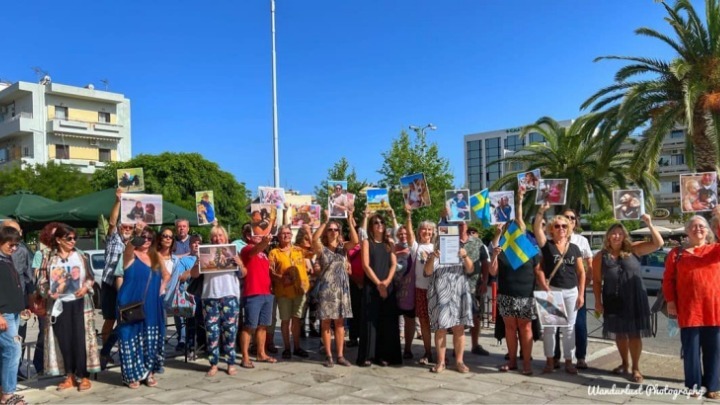Court vindicates animal shelter on Crete after false charges of profiteering

A local court on Crete unanimously ruled in favor of the director of an animal shelter in the Chania region, dismissing all charges of profiteering from the placement of animals, mostly dogs, abroad.
Greek-American Elizabeth Iliakis, who was born in the United States and whose parents were Cretans living in New York, returned to Greece and started directing the Souda Shelter in 2016 as a volunteer. At the time, the shelter was hosting 253 animals, most of which were adopted by people living in Germany, Finland, Sweden and Denmark.
"I was accused of selling dogs, profiteering from animals leaving for homes abroad," Iliakis says. "They accused me of illegal tranport of animals and running an illegal shelter," she tells Athens-Macedonian News Agency (ANA-MPA). Her lawyer, Maria Evangelou-Papadaki, presented the court with all accounting records for the past year "to prove that all funds end up in an NGO bank account and are recorded, as expenditures are." Supporters stood outside the court, holding photos of the animals they had adopted.
The case can serve as a precedent for a lot of other animal societies that have been sued in courts for the same issue. "This victory was a great relief, that we are not seen as being weird, but they understand," Iliakis says. The decision, she notes, "is good for the animals of Greece, and a prioneering decision that will definitely influence all other court cases following mine."
As she explained to ANA-MPA, the problem begins from the inadequate implementation in Greece of the European law for tracking animals adopted abroad. Greek authorities abruptly stopped providing necessary certificates several years ago, opening the way for baseless suits against animal lovers. She expressed the hope that under the recently passed law on protection of animals, they will restart issuing them.
Vetting owners
"The responsibility lies exclusively with the Greek state," she explains. "Greeks love animals as much as Germans, Swedes, any peoples do. You can tell by the majority of homeless animals that are not feral (...) Homeless animals in our public squares and parks are in very good state. Greeks love animals as much as any European does. It's simply that the state has ignored this huge problem for many years, and now we don't know where to start from," notes Iliadis, who has been serving as a volunteer for the past 24 years.
Those who took her to court, she says, ironically used the photos she had posted on social medai as proof of their charges she was selling the animals, all of which are neutered. "I post them on purpose, so that people realize that the number of homeless animals that live here cannot - it is not possible - to be absorbed by Greek society."
Adopting an animal from the shelter involves a careful vetting of potential new owners, she explains, including a recommendation by a veterinarian who knows the family that is adopting, video calls, and a local volunteer to check the new owners' facilities. Individuals who adopt first sign a contract stipulating they will not give the animal elsewhere or euthanize it without agreement by Souda Shelter first, then they either pick up the animal in person on Crete or arrangements are made to ship it to them. "The process is meticulous because we are not desperate to get rid of our animals," she tells ANA-MPA, as this prevents suffering on all sides.
Cause for optimism
People who adopt animals from the Souda Shelter "know us and understand what we go through, (and) keep sending us photos on their own initiative," Iliakis says. "Every day, I get 20 photos from animals that have settled in new homes. We have a steady relationship with people. (...) When they adopt an animal from us, we say 'Welcome to the family!' We are a family, we are always with you for anything that happens, any time."
Despite it all, Iliaki underlines that "we are not the crazies who loved animals and place them above human beings - this myth does not exist anymore, it has evaporated." There is cause for optimism, she underlines, especially with younger generations that are very sensitive.
"There is great progress that we must recognize - things are improving a lot. Along with all these, we must push the state a bit more to do its job as well. Nothing will change in a day, but along with the state, animal societies will feel relief and will be able to do what should have been done a long time ago," Iliakis notes, calling for people to help animals and other human beings in need, starting with their neighbors.
"Our door is open, forever, for anyone coming for holidays n Chania who wants to help out, or to send us equipment or funds or their love - simply giving us love and understanding, we'll be very happy," she says.
- Sofia Mandilara
(Feature story has been condensed from the Greek; photos by S. Mandilara)

